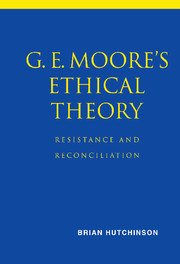Book contents
- Frontmatter
- Contents
- Introduction: Irony, Naïveté, and Moore
- 1 Simplicity, Indefinability, Nonnaturalness
- 2 Good's Nonnaturalness
- 3 The Paradox of Ethics and Its Resolution
- 4 The Status of Ethics: Dimming the Future and Brightening the Past
- 5 The Origin of the Awareness of Good and the Theory of Common Sense
- 6 Moore's Argument Against Egoism
- 7 The Diagnosis of Egoism and the Consequences of Its Rejection
- 8 Moore's Practical and Political Philosophy
- 9 Moore's Cosmic Conservatism
- 10 Cosmic Conservatism II
- Bibliography
- Index
1 - Simplicity, Indefinability, Nonnaturalness
Published online by Cambridge University Press: 28 July 2009
- Frontmatter
- Contents
- Introduction: Irony, Naïveté, and Moore
- 1 Simplicity, Indefinability, Nonnaturalness
- 2 Good's Nonnaturalness
- 3 The Paradox of Ethics and Its Resolution
- 4 The Status of Ethics: Dimming the Future and Brightening the Past
- 5 The Origin of the Awareness of Good and the Theory of Common Sense
- 6 Moore's Argument Against Egoism
- 7 The Diagnosis of Egoism and the Consequences of Its Rejection
- 8 Moore's Practical and Political Philosophy
- 9 Moore's Cosmic Conservatism
- 10 Cosmic Conservatism II
- Bibliography
- Index
Summary
Lay of the Land
The revolution G. E. Moore wishes to effect in Principia Ethica begins with his famous claim that the property good is simple, indefinable, and non-natural. Upon their full recognition and acknowledgment that good has these properties, philosophers will no longer commit the “naturalistic fallacy” of identifying or confusing good with anything else. This will restore to philosophers the plain truth they have mysteriously lost sight of, that good, the property in which all value is grounded, is utterly unique. The importance of this for ethics cannot be overestimated. Having wandered for twenty-five-hundred years in a fog of their own making, philosophers have now been given a chance to achieve not only a fully satisfactory understanding of good, but also a fully satisfactory understanding of the things that are good. The sense of dissatisfaction that has clung to ethics with the fog will disappear as intellect discovers what instinct has always known, that there are things enough to make life worth living.
Visionaries are not always patient. So it is no surprise that Moore's Principia account fails to do full justice to the nature of these properties and the role they play in the determination of good's nature. The sketch offered here, to be fleshed out in future chapters, seeks to correct this defect. Very broadly, Moore argues that good's logical and ontological independence from all other properties is grounded in its simplicity and indefinability, with indefinability being much the more important of the two.
- Type
- Chapter
- Information
- G. E. Moore's Ethical TheoryResistance and Reconciliation, pp. 16 - 38Publisher: Cambridge University PressPrint publication year: 2001



